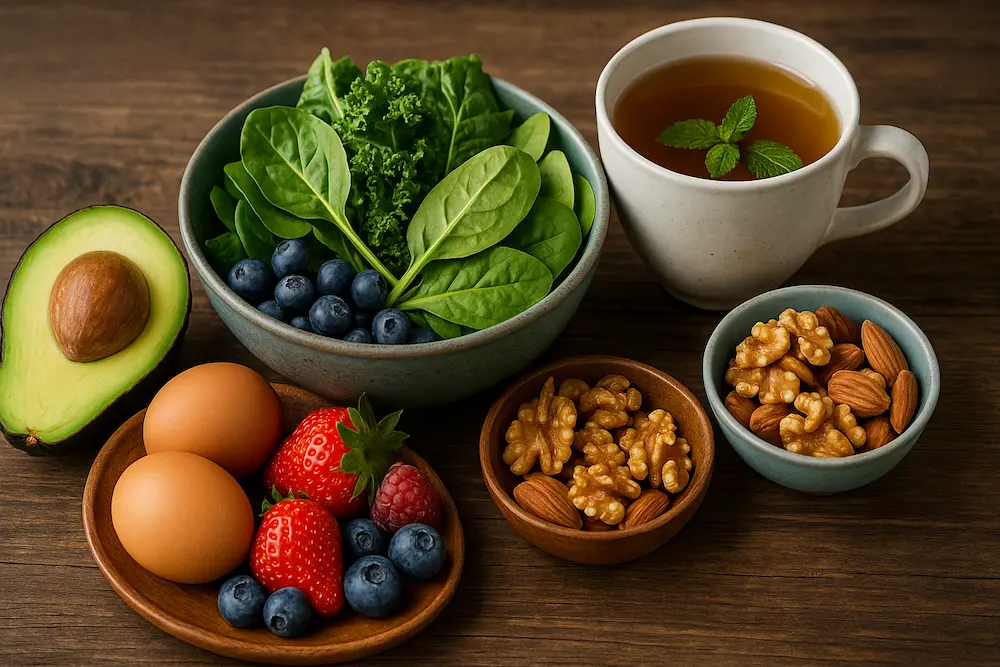This Nutrient Is a Big Deal (And You’re Probably Not Getting Enough)

Scrambled, poached, boiled or baked into banana pancakes. However you do your eggs, now’s the time to love them harder. Because there's a not-so-little nutrient called choline that your growing baby and your pregnant body seriously need. The kicker? Nearly 9 in 10 pregnant women aren’t getting enough of it.
Let’s talk about what choline does, why it matters so much in pregnancy, and which foods will help you get more of it without overthinking every meal.
What Even Is Choline, and Why Does It Matter During Pregnancy?
Choline is a nutrient your body needs more of during pregnancy. It’s a bit of a multitasker. It helps your baby’s brain and spinal cord develop properly, supports memory and learning later on, and even helps keep your own liver healthy during pregnancy.
Thing is, your body can’t make enough of it on its own while you're expecting. So unless you're eating choline-rich foods regularly or taking a supplement, there's a good chance you're not getting what you need.
And just to add a little extra urgency, studies show that how much choline you get while pregnant can actually influence your child’s memory, attention and behaviour later in life.
How Much Choline Do Pregnant Women Need?
The recommended amount is around 450mg per day. But here’s the rough part. About 88% of pregnant women aren’t hitting that target. And low choline levels have been linked to:
- Neural tube defects in babies
- Learning and memory difficulties down the track
- Fatty liver disease in mums-to-be
The researchers say that choline starts making an impact early in pregnancy. Possibly before you even realise you’re pregnant. So whether you’re already expecting or just thinking about it, now is a good time to check in on your intake.
Best Choline-Rich Foods to Add to Your Diet When Pregnant
Here’s the good news. You don’t need fancy powders or supplements to boost your choline. You can absolutely eat your way there. Some of the top food sources include:
- Eggs (especially the yolk). One large egg gives you about 125mg
- Meat like beef, chicken and pork
- Fish like salmon and cod
- Dairy such as milk, yoghurt and cheese
- Plant-based foods like broccoli, Brussels sprouts, soybeans and peanuts
- Whole grains like quinoa (not as high but still helpful)
Whether you’re eating everything or keeping things plant-based, there are solid food options to work with.
Can Pregnant Women Eat Eggs?
Yes, eggs are one of the easiest ways to get choline. But let’s talk safety for a second.
If you're eating eggs raw or runny, you’ll want to make sure they’re safe where you live. Some places recommend avoiding raw or undercooked eggs during pregnancy because of the risk of salmonella. It probably won’t harm your baby, but it can leave you very sick and that’s the last thing you need.
Here’s the general advice:
- Cook eggs until the yolk and white are both firm
- Be careful with homemade sauces or desserts that use raw egg, like mayo or mousse
- If eggs are pasteurised or certified safe in your area, they’re usually fine runny. If not, cook them through
If you’re unsure, ask your midwife or doctor. Food safety rules can vary depending on where you live.
Real Talk: This Isn’t About Being “Perfect”
You don’t need to log every bite or obsess over nutrition charts. This is just one of those small, powerful things you can do to support your baby’s brain and your own wellbeing too.
Some days it’s boiled eggs and broccoli. Other days it’s cheese toast and a nap. That’s motherhood, even before the baby arrives.
Have you found any easy ways to sneak more choline into your meals? Share your hacks or favourite foods in the comments below. Someone out there needs your tip today.
If you need help or have questions, come join us and post in our Pregnant Forum by clicking here. We're here to help!







Responses